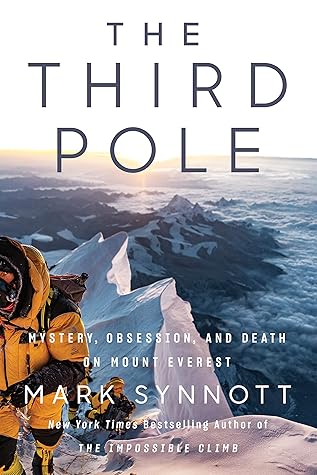More on this book
Community
Kindle Notes & Highlights
by
Mark Synnott
Read between
January 22 - January 25, 2023
As a veteran of the Battle of the Somme in the First World War, George Mallory can be taken at his word when he wrote that climbing Mount Everest was “more like war than sport.”
And I suppose it’s not surprising that I found something I wasn’t expecting on the roof of the world. Everest turned out to be a window on the best of humanity. And the worst.
Truth be told, I wasn’t interested in Mount Everest at all. I saw the mountain as a place overrun with inexperienced climbers who stacked the odds in their favor by outsourcing the most significant risks to the climbing sherpas, who carried the weight of everyone’s egos on their shoulders—and frequently paid with their lives.
the most ferocious mountains on Earth, rising to altitudes barely attainable by even the strongest mountaineers, have yet to reach their full stature.
“If we can’t tell anyone what we’re doing, how are we supposed to get this funded?” asked Thom. “You know the old quote, right?” said Holzel. “‘To succeed, you have to break the rules.’ You have to understand that there are some questionable legalities. I don’t mean you’re going to do anything that’s overtly illegal, but this whole issue is fraught with people who want to sue.” “Over what?” “Ownership of the camera, of course. Read point number four.” Thom slipped on his glasses and read aloud: “If the VPK camera is found, say a prayer to your favorite god because you are going to be in for a
...more
It was almost as if there were an invisible ceiling at 28,000 feet, protecting Everest’s throne room from the scrabbling hands of mortal man. With each failed attempt, the mountain’s mystique grew.
Sometimes science is the excuse for exploration. I think it is rarely the reason.
In the midst of the 1922 expedition that cost seven porters their lives, he had written to David Pye that Everest was “an infernal mountain, cold and treacherous . . . the risks of getting caught are too great; the margin of strength when men are at great heights is too small . . . It sounds more like war than sport—and perhaps it is.”
“Is this form of fully catered climbing,” I wrote, “enabled by a small army of Sherpas and other mountain workers who are exposed to enormous risk, really climbing at all?”
“It’s extraordinary to see these sedentary slob attorneys from Chicago go up Everest with a fair amount of oxygen and do fine,” says Hackett, “while marathon runners and triathletes fall by the wayside. This is why we call altitude the great equalizer.”
The gene that helps Sherpas to be the most prolific high-altitude mountaineers in the world came from an extinct branch of the human tree that died out some 10,000 years ago.
He’d told his wife that he understood his body and knew his limits, and that when and if he got to the point where it was prudent to turn back, he would not hesitate to do so. This had sounded perfectly rational and reasonable in the comfort of their living room in Vienna, but now, on the crest of the Northeast Ridge, he realized that this high in the Death Zone, there is no black and white, only overlapping shades of gray.
“For more than a century, Western climbers have hired Nepal’s Sherpas to do the most dangerous work on Mount Everest. It’s a lucrative way of life in a poor region, but no service industry in the world so frequently kills and maims its workers for the benefit of paying clients. The dead are often forgotten, and their families left with nothing but ghosts.”
Mountain climbing gave her a sense of control she had never experienced before. Whether she climbed a mountain or not was no one’s decision but her own, and mountains had no expectations of her.
“There was a sudden clearing of the atmosphere, and the entire summit ridge and final peak of Everest were unveiled. My eyes became fixed on one tiny black spot silhouetted on a small snow crest beneath a rock step in the ridge; the black spot moved. Another black spot became apparent and moved up the snow to join the other on the crest. The first then approached the great rock step and shortly emerged on top; the second did likewise. Then the whole fascinating vision vanished, enveloped in cloud once more.”
“This upper part of Everest must be indeed the remotest and least hospitable spot on earth,” he later wrote, “but at no time more emphatically and impressively so than when a darkened atmosphere hides its features and a gale races over its cruel face. And how and when more cruel could it ever seem than when balking one’s every step to find one’s friends.”
Looking at it now, I’m struck by the thought that our greatest endeavors are less about what we set out to do than what we bring back.
orienting one’s life around a peak like Mount Everest is a perilous proposition, not only because the mountain will likely kill you eventually, but because it may also consume your soul in the process.


